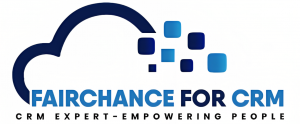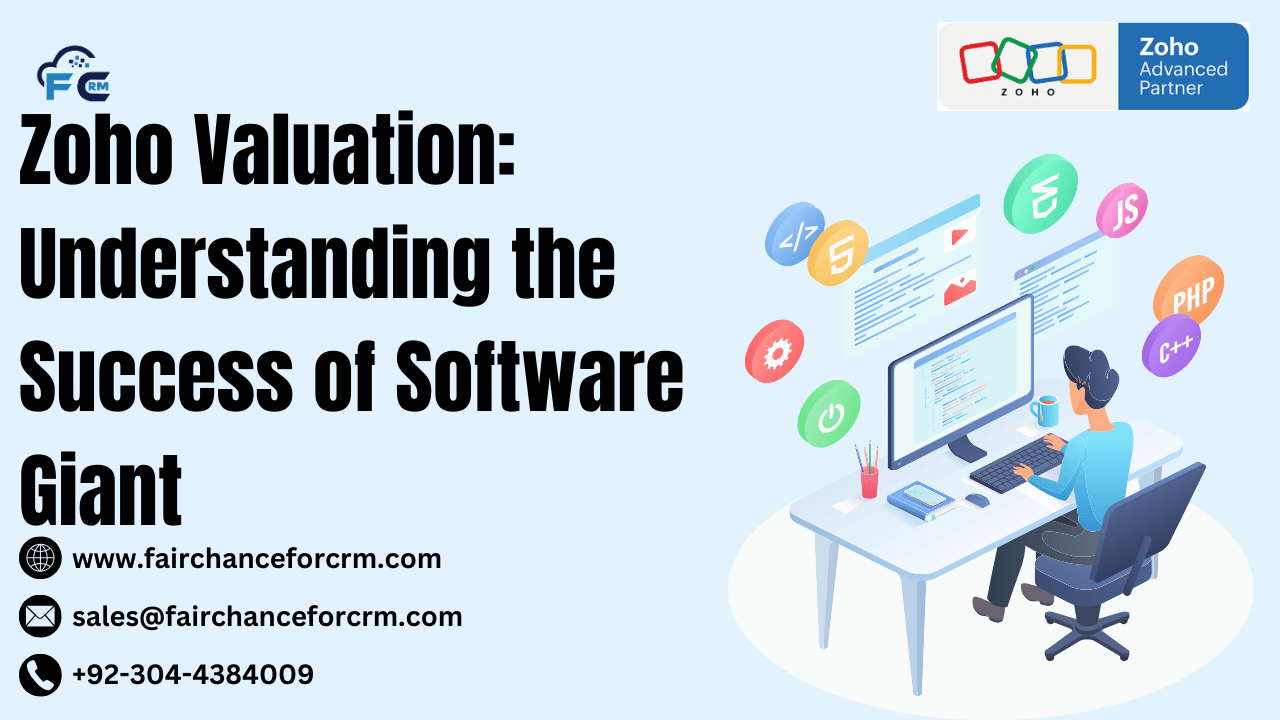Zoho Valuation: Understanding the Success of Software Giant. Unlike many of its competitors, Zoho has taken an unconventional path—remaining entirely bootstrapped while growing into a global powerhouse. Because of its solutions that cater to a range of business needs, such as project management, finance, and CRM, Zoho has accumulated an estimated valuation of over billion dollars.
Also Read:
- Zoho Shifts: Streamlining Workforce Scheduling for Your Business
- How Zoho Toco Enhances Your Business Workflow – FAIRCHANCE FOR CRM
- Zoho CRM Google Meet Integration | FAIRCHANCE FOR CRM
- Zoho Analytics Not Equal | FAIRCHANCE FOR CRM
- Zoho Kiosk Select Lookup – FAIRCHANCE FOR CRM
Zoho Valuation: Understanding the Success of Software Giant: The Rise of Zoho
Prior to its 2009 makeover, Zoho was founded in 1996 as AdventNet, a network management firm, by Sridhar Vembu and Tony Thomas. Its amazing journey, which includes everything from network tools to comprehensive business software, shows the company’s adaptability, ambition, and persistent dedication to creating long-term value.
Zoho Valuation: Unique Approach to Funding and Growth
One of Zoho’s most intriguing aspects is its steadfast commitment to self-funding. Unlike most tech giants that rely on venture capital or external funding rounds, Zoho remains entirely bootstrapped. Because of its independence, Zoho has been able to manage its expansion, put earnings back into new product development, and stay away from the demands of being VC-funded or publicly listed. Due to Zoho’s lack of debt and ownership dilution, this decision has greatly increased Zoho valuation and improved its long-term financial stability.
Key Factors Driving Zoho Valuation
1. Extensive Product Offering and Market Diversification
- Project management, human resources, financial, and CRM apps are just a few of the many business solutions that Zoho offers. Zoho appeals to small, medium, and large businesses since it offers a one-stop-shop solution with more than 50 connected applications.
- Zoho’s wide range of products allows it to generate revenue from multiple sources, reducing its dependence on any one product and enhancing its stability as an investment prospect.
2. High Customer Retention and Loyalty
- Zoho is known for its focus on customer experience and affordability. Zoho has developed a devoted clientele with long-term agreements by providing high-quality goods at a lesser cost than rivals.
- A significant factor in Zoho’s worth is consistent recurring revenue, which is fueled by a high client retention rate. Many of its customers who start with one or two Zoho products often adopt other offerings from its ecosystem, further solidifying its market position.
3. Innovation and R&D Investments
- Zoho reinvests a significant portion of its revenue into research and development. With this strategy, the firm can continue to lead the market and introduce new features that cater to the changing demands of companies across the globe.
- With Zia, the AI assistant, integrated into all of its products, Zoho Valuation has notably been a leader in the integration of AI. Because of its constant dedication to innovation, Zoho’s software is more valuable and appealing to companies trying to maximize efficiency and productivity.
4. Geographic and Economic Resilience
- With headquarters in India and offices worldwide, Zoho benefits from operating in a market with a relatively low cost of labor while delivering products internationally. High profit margins are the result of this geographic approach.
- Furthermore, Zoho’s solutions are made to serve companies in a variety of industries and economies, providing a degree of financial stability that draws in investors and raises the company’s Zoho valuation.
5. Emphasis on Privacy and Ethical Business Practices
- Zoho has consistently emphasized privacy and a commitment to ethical business. Unlike competitors that depend on third-party advertising, Zoho’s revenue comes solely from its software sales. Clients who value privacy have come to trust and support the business because of its privacy-first approach, particularly in industries like healthcare and finance.
How Zoho Valuation Compares with Competitors
With a valuation over billion, Zoho stands out in a competitive landscape that includes giants like Salesforce and Microsoft. While Salesforce, valued at over 0 billion, and Microsoft, worth trillions, hold significant market shares, Zoho’s customer-centric model and price competitiveness offer strong advantages. For instance, Zoho CRM is frequently chosen by small and medium-sized enterprises seeking sophisticated CRM features without the high cost because it is typically less expensive than Salesforce.
Additionally, Zoho stands out from ad-driven behemoths like Google because to its distinctive views on privacy and data ethics, which can appeal to companies who are worried about data security. This strategy has given Zoho a unique market position that complements its rising Zoho valuation and expanding worldwide presence.
Zoho’s Financial Health and Profitability
Zoho’s financial health is robust, partly due to its lack of debt and reliance on internal funding. The company’s revenue figures are private, but analysts estimate it to be over billion annually, with strong cash reserves and a highly profitable business model. This stability enhances Zoho valuation and allows it to make bold moves, such as expanding its workforce and facilities worldwide, without external pressures from investors.
Implications for the SaaS Industry
Zoho’s strategy has demonstrated that a SaaS business may get a high valuation without compromising its autonomy or moral principles. In the SaaS industry, this has set a distinctive precedent that encourages other businesses to prioritize long-term profitability over immediate advantages.
Future Outlook for Zoho Valuation
As Zoho continues to expand its suite of applications, invest in AI, and attract a global clientele, its valuation is likely to grow. In addition to increasing its pool of talent, this might save operating expenses and increase profitability.
Conclusion
Zoho’s remarkable valuation was a result of its robust product portfolio, autonomous strategy, and focus on customer satisfaction. By putting privacy first, reinvesting in R&D, and keeping a loyal customer base, Zoho has become a self-funded leader in the SaaS market. The company’s valuation may increase further as a result of its sustained emphasis on sustainable growth and expansion, solidifying its standing as a leader in the software sector.
FAQs
1. How much is Zoho worth?
While Zoho is privately held and does not disclose exact figures, estimates place its valuation over billion, with revenue exceeding billion annually.
2. Why is Zoho valuation notable compared to its competitors?
Zoho’s valuation is notable because it’s entirely self-funded and has achieved high growth without external investors, a rarity among tech giants.
3. What makes Zoho different from other SaaS companies?
Zoho’s commitment to privacy, ethical business practices, and a vast suite of affordable products makes it distinct. It’s also one of the few large tech companies that has chosen to stay private.
4. Is Zoho planning to go public?
As of now, Zoho’s leadership has expressed no interest in going public, preferring to maintain independence and reinvest its earnings back into the business.
For more information about the Zoho Valuation, visit this link.
If you want to Free Trail Zoho, click on this link.




